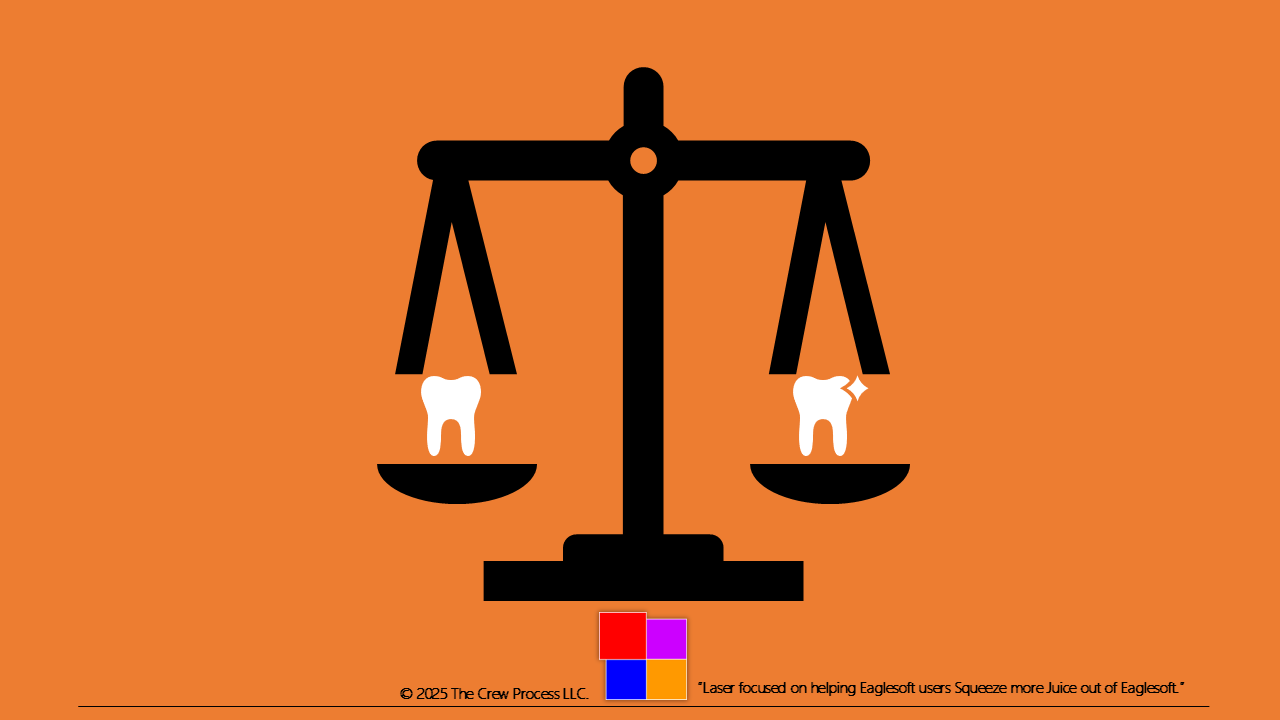How Andre Approaches Adjustments In Eaglesoft
UPDATED 5/22/2024
Adjustments make an impact on so many transactions on daily basis but, I have found that so many of them are not used properly. First, let’s talk about Adjustment Impact. Are Adjustments supposed to impact Production, Collections or Adjustments? Start with 99% of Adjustment Types should Impact Production.
I use a simple way to figure this out.
Production Adjustments lower Production
Example:
Do a Service for $1. Patient Doesn’t Pay. Bad Debt Write Off of $1 lowers Production.
Collection Adjustments lower Collections
Example:
Patient Pre-pays $1. Patient Dies. Returning $1 to widow lowers Collections.
Adjustment Adjustments reverse Adjustments
Example:
Add Finance Charge of $1 then realize Patient Check was in today’s mail. Reverse $1 charge as Adjustment.
Remember that offices who are using Fee Schedules don’t typically need to use an Adjustment at the time of Insurance payment but occasionally there might need to be a manual adjustment. In that case the office should create a unique Adjustment Type for that in-network carrier. The format I suggest for naming these Adjustments is the following:
Provider Adjustment for [carrier name]
That way this phrase will be part of an Account history instead of a generic “Insurance Adjustment” and, in conjunction with the Managed Care Utilization report, an office be able to run an Adjustment by Type report to track what plans you have Adjusted for. All of these adjustment must be set to Impact Production as they lower the Production.
Example:
Your Standard Fee for a Crown is $1,500 and you adjust $500 off as a In-Network Provider. You have lowered Production by $500.
Here are some other Adjustment Type suggestions:
Provider Adjustment for Misc Insurance (this is the edited default Insurance Adjustment)
Courtesy for Professionals (This is the edited default Processional Courtesy)
Refund to Insurance (This is the edited default Insurance Refund)
Refund to Patient (This is the edited default Patient Refund)
Forgive Difference Adj. (Default that can’t be edited or deleted)
Miscellaneous Adjustment (Default that can’t be edited or deleted)
Administrative Adjustment to Correct Balance
Returned Check (NSF)
If you’ve notices that when you post an Insurance Payment you get a Pop-up window with an Adjustment type. That Adjustment Type is set by the Adjustment Type chosen in the Employer setup screen below the Fee Schedule and Coverage Book.
Here is a simplified view of Adjustments:
If you do a Crown and your Standard Fee is $1,000 and you "Adjust" off $200 based on a Contract with XYZ insurance, then you are Adjusting your Production. Not Collections, Not Adjustments. The amount has to come from where it "started".
If your office was posting its firsts and ONLY transaction.
You did a Crown. $1,000
You adj $200 from Production
Ending in a Day sheet with Production of $800
You collect $400 from the Patient
Est Ins is $400
You close for the day and Magically tomorrow you get an insurance check for $400 and nothing else happens in the practice.
Start the day with an AR or $400
Collections of $400
Ending AR of $0
Here is my ONLY Exception to this advice:
When it comes to Adjustments, my “rule” is always:
If it went in as Production, it comes out as Production.
BUT in a Bad Debt Write Off, I shift to:
If you’re Bad Debt Writing off, the Adjustment should Impact Adjustments.
It then has No Impact on Production or Collections. The ONLY time you adjust to Collections is a Refund. A Bad Debt is not the “fault” of the Producer/Provider.
DISCLAIMER:
This is a resource guide and all decisions on each dental office setup should remain the sole decision of the dentist/owner of the practice. Eaglesoft is a registered trademark of Patterson Dental Company. All other software or products mentioned are the property of their respective owners. Although Andre Shirdan was an employee of Patterson Dental, he is not associated with Eaglesoft or Patterson Dental Company or endorsed by Patterson or any other Company Mentioned in this blog

















Andre Talks About Avoiding “Modified” in Eaglesoft Progress Notes. The Crew Process LLC is the number one Source for Eaglesoft Training on the Net.